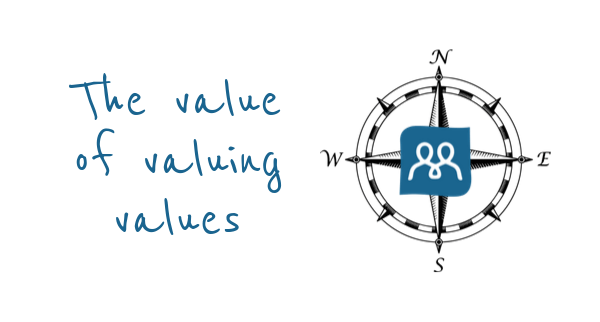‘Vision statements’, ‘mission statements’, ‘core values’… yep, I know what you’re thinking… what a load of crap! “They were probably created by a bunch of Business Coaches or Academics who have no concept of what running a business is all about. All theory, no practice… not relevant to me, I’m moving along now.”
If this sounds like you, I can relate. I used to think core values made absolutely no difference to the outcomes a team experienced. And I was right… at least for most teams. But that is because core values are kind of like a gym membership – they don’t make a difference if you don’t use them.
It was when I started working with one of my awesome clients, Verse Wealth, that my perspective shifted. Significantly. I had never met a team with so much alignment, cohesion and purpose on a daily basis and this was the way it was because of their commitment to Verse’s values. They knew what they were about and held themselves against these standards every single day. It was both inspiring and paradigm-shifting for me and since then, I have gone down a rabbit hole of exploring the best businesses and teams in the world, seeking to understand how they use values in their daily existence. This has allowed me to help a number of businesses to connect to their core values and each and every time we go through this process, the power of this clarity and the flow-on benefits astound me.
I now understand and can see firsthand that when rolled out properly, this is valuable, important and powerful stuff for a business. All about substance, nothing to do with style.
My intention behind this post is to get you to reconsider your view on core values, and if you don’t have a view, to develop a positive one. I want you to want core values. And if you already have a set of them gathering dust on a shelf, I want you to want better ones that excite you and create powerful alignment throughout your business.
What are core values anyway?
To put it simply, core values are the way a group of people decide to collectively act. They are the embodiment of the phrase “people like us do things like this”. Quite simply, they are the best way that I know for a business to tangibly represent its culture. It turns the fuzzy, often intangible DNA of a business into a clear and simple list of words or phrases that summarise what behaviour they collectively agree is important. They give clarity to teams about how they’re expected to act and this consistency of actions becomes your culture and eventually, your reputation.
For those of you not feeling the ‘values vibe’ at this stage, your business has a culture whether you know it or like it or not. Great cultures make people on the inside and outside of your business feel better, and the opposite can be said for poor culture. So as a leader, you’re better off taking control of your culture and defining what it is and what it should be, rather than allowing the wrong culture or a less than optimal one to create itself. Core values can give you this direction.
If the words themselves, “core values” make you cringe – you don’t have to call them that! My clients use phrases such as ‘Family Rules’, ‘Our commitments to each other’ and ‘How we roll’ to capture their values. Perhaps one of these phrases could be a useful reframe for you in shifting your thinking here.
Long story short if there is one thing that I have seen that separates the good businesses from the truly great ones, it’s their culture. And I have never seen a business scale a great culture without a set of agreements which codify the beliefs and behaviours that sit at the centre of what this culture’s all about. This isn’t about a marketing message or a pretty piece of website content. It’s a team’s stake in the ground, emphatically stating who they are and what they stand for.
What I love most about core values
I really want to bring this concept to life for you and show you how it may apply to your day to day working life. So in no particular order, here are my favourite things about core values.
THEY HELP YOU HIRE THE RIGHT PEOPLE
Once someone ticks the ‘skills and experience’ box, we often then rely on ‘vibe’ in hiring decisions. But in important decisions such as ‘who will next join our team / who will be partly responsible for the future of our business’, we need more rigour than that. Vibe didn’t work for Dennis Denuto and it will rarely work for you in the long run. Adapting your core values into interview questions and a checklist for recruitment can give you an objective measurement tool, helping you to assess someone’s cultural fit before they enter your team.
THEY HELP YOU MANAGE AND COACH YOUR EXISTING TEAM
While assessing job performance is a critical component of 1:1 performance review, why not also build a process where employees are scored against each of your values? It opens the door for a meaningful and constructive discussion about how they do their job and some clear direction for how they can better align themself with the team’s expected standards.
THEY ALLOW YOU TO OBJECTIVELY MEASURE AND IMPROVE YOUR SERVICE
Every business strives for consistency in their customer or client service experience, whether it be how each moment in your service experience feels or whether different people are delivering it in a similar way. If you were to create a checklist for how your service experience should feel, incorporating your core values would be the perfect first step. You can use your values to evaluate the main components of what you do for clients, as well as the various emails, phone calls and brochures that support this. The result is a clearer definition of how ‘on brand’ your business truly is.
AND MY FAVOURITE BENEFIT…
One of the most beautiful benefits of a shared set of agreed standards of behaviour is the ability to externalise a team’s feedback to each other.
If someone overcomplicates their client meetings, writes longwinded emails or adds too many irrelevant layers to projects, walking up to them and telling them these three things would be awkward, and the outcome is likely to hurt their feelings or do some damage to your working relationship.
But if ‘Keep it simple’ is one of your team’s core values, it gives you permission to call these things into question and it’s much more likely that the feedback and a constructive lesson will sink in. Because it wasn’t you that gave them this feedback, it was the agreed standard of behaviour. The same standard that they agreed to at some point (be it at the inception of your core values or during their hiring process).
And this my friends is the real magic of core values. They externalise ‘constructive criticism’ and make it easier to deliver and easier to absorb. People buy-in to the values, so they’re more likely to want to live up to them and understand when they have failed to. They are an agreement to ourselves and to each other. The result being, a culture we all aspire to be part of and are able to keep each other accountable to.
This is a perfect example of clarity in expectations leading to alignment in behaviour. It doesn’t guarantee complete compliance 100% of the time, but it helps your team to know what types of behaviour they should aspire to personally uphold and collectively expect. And when you have a group of people with different talents, doing their own version of awesomeness in a way that is underpinned by a common view of what’s important, a pretty special group identity takes shape. One which has the potential to improve the lives of its constituents, as well as the people they are doing it all for; your clients.
SO WHAT’S NEXT?
Liking the idea of core values is one thing, but working out what your list is, getting the team’s buy-in and embedding them into your business-as-usual is another story altogether. I will cover these areas in future articles.
For now, all I want you to do is give yourself a ‘pulse check’. Start to tune in to what commonalities exist in your team. Sure, you’re all different people from different backgrounds with different jobs, but what are the things that unite you? How do you see the world similarly? What is consistent about the way you all act? How do you think your business feels to the people on the inside, and how is that being reflected on the outside?
Start observing these patterns of behaviour and considering if they are contributing to the type of culture you aspire to being a part of, or whether some small or not-so-small changes are required.
And if you already have a documented list of values, do they reflect the commonalities that your team share or do they have no real connection to what’s really going on within your walls? Do your team reference them regularly in conversation? Does your list of values sound good but not actually make your team feel anything? How embedded are they into your ‘business as usual’?
I hope this article has been valuable (pun completely intended). Please feel free to hit me up if you have any questions on the above.
Michael Back, Founder of Human to Human


